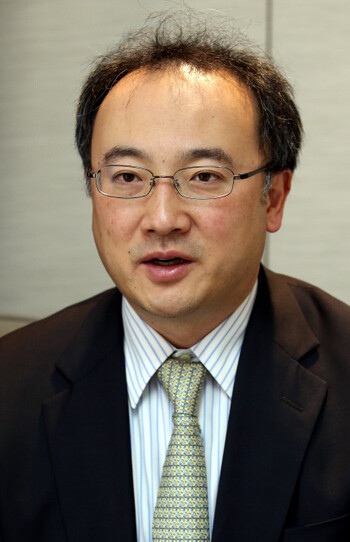hankyoreh
Links to other country sites 다른 나라 사이트 링크
Expert: to North Korea, the South isn’t an economic partner anymore

“You do hear people in South Korea talking about a railway connecting with continental Asia through North Korea, but North Korea is obviously going to see that as a very South Korea-centered plan.”
Mitsuhiro Mimura, a researcher at Japan’s Economic Research Institute for Northeast Asia (ERINA), argued on Nov. 20 that North Korea no longer views the South as a partner in economic cooperation.
Mimura, who has visited North Korea and interacted with academics there nearly 30 times over the past two decades, was in Busan this week to participate in the Hankyoreh-Busan International Symposium.
“If you look at things from North Korea’s perspective, any kind of long-term economic cooperation program is basically impossible because the South’s North Korea policies change every five years [with the change of governments in South Korea],” he said.
“Things like support have been left out of the basic components in South Korea’s economic development plans,” Mimura added. “People basically see it as something they can get if South Korea decides to do it.”
The situation with Seoul stands in stark contrast to Pyongyang’s relationship with Tokyo, Mimura added.
“Leaving aside the matter of South Korea being part of a ‘regime competition,’ North Korea sees Japan as the only capitalist power in Asia that it can depend on for technology and capital,” he explained.
But Mimura also predicted it would take time for North Korea to open its economy to the outside.
“North Korea is at the point now where it’s concerned mainly with addressing survival issues and supplying enough daily essentials,” he said. “For the next three years, we can expect its policies to be focused on things like encouraging domestic agricultural production and trade with China.”
“If it’s successful, then it’s going to need to trade and interact with other countries while it’s trying to figure out which industries to develop,” he added.
“In the long term, it’s going to focus on openness over ten to twenty years.”
Mimura played down the economic repercussions of Tokyo’s intensifying political conflicts with Seoul and Beijing over historical and territorial issues, since Shinzo Abe took office as prime minister.
“Political conflicts aren’t really having a major impact on immediate economic relationships,” he argued
He went on to explain that because all three countries are members of the World Trade Organization, any politically motivated restrictions on imports or exports involving specific countries would lead to legal issues and hurt credibility with the international community.
By Kim Oi-hyun, staff reporter in Busan
Please direct questions or comments to [english@hani.co.kr]
Editorial・opinion
![[Guest essay] Maybe Korea’s rapid population decline is an opportunity, not a crisis [Guest essay] Maybe Korea’s rapid population decline is an opportunity, not a crisis](https://flexible.img.hani.co.kr/flexible/normal/500/300/imgdb/original/2024/0430/9417144634983596.jpg) [Guest essay] Maybe Korea’s rapid population decline is an opportunity, not a crisis
[Guest essay] Maybe Korea’s rapid population decline is an opportunity, not a crisis![[Column] Can Yoon steer diplomacy with Russia, China back on track? [Column] Can Yoon steer diplomacy with Russia, China back on track?](https://flexible.img.hani.co.kr/flexible/normal/500/300/imgdb/original/2024/0430/1617144616798244.jpg) [Column] Can Yoon steer diplomacy with Russia, China back on track?
[Column] Can Yoon steer diplomacy with Russia, China back on track?- [Column] Season 2 of special prosecutor probe may be coming to Korea soon
- [Column] Park Geun-hye déjà vu in Yoon Suk-yeol
- [Editorial] New weight of N. Korea’s nuclear threats makes dialogue all the more urgent
- [Guest essay] The real reason Korea’s new right wants to dub Rhee a founding father
- [Column] ‘Choson’: Is it time we start referring to N. Korea in its own terms?
- [Editorial] Japan’s rewriting of history with Korea has gone too far
- [Column] The president’s questionable capacity for dialogue
- [Column] Are chaebol firms just pizza pies for families to divvy up as they please?
Most viewed articles
- 1Under conservative chief, Korea’s TRC brands teenage wartime massacre victims as traitors
- 2Months and months of overdue wages are pushing migrant workers in Korea into debt
- 3[Guest essay] Maybe Korea’s rapid population decline is an opportunity, not a crisis
- 4[Column] Can Yoon steer diplomacy with Russia, China back on track?
- 5After election rout, Yoon’s left with 3 choices for dealing with the opposition
- 6First meeting between Yoon, Lee in 2 years ends without compromise or agreement
- 7[Column] Behind factional animus of Korean politics, victim mentality festers
- 8‘We must say no’: Seoul defense chief on Korean, USFK involvement in hypothetical Taiwan crisis
- 9[Editorial] Japan’s removal of forced labor memorial tramples on remembrance, reflection and friends
- 10[Guest essay] A society in which old age becomes a burden